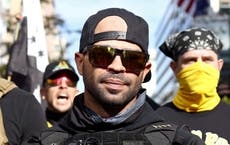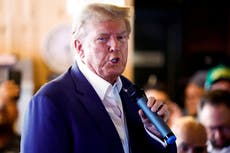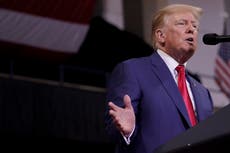The Independent's journalism is supported by our readers. When you purchase through links on our site, we may earn commission.
The Proud Boys sentencing is remarkable. Donald Trump should be paying attention
What does this mean for Trump?

Your support helps us to tell the story
From reproductive rights to climate change to Big Tech, The Independent is on the ground when the story is developing. Whether it's investigating the financials of Elon Musk's pro-Trump PAC or producing our latest documentary, 'The A Word', which shines a light on the American women fighting for reproductive rights, we know how important it is to parse out the facts from the messaging.
At such a critical moment in US history, we need reporters on the ground. Your donation allows us to keep sending journalists to speak to both sides of the story.
The Independent is trusted by Americans across the entire political spectrum. And unlike many other quality news outlets, we choose not to lock Americans out of our reporting and analysis with paywalls. We believe quality journalism should be available to everyone, paid for by those who can afford it.
Your support makes all the difference.The Trump accountability era continues.
Enrique Tarrio, the former Proud Boys national chairman, has been sentenced to 22 years in prison for his role in organizing the violent January 6 insurrection. The former extremist group leader was convicted on charges including seditious conspiracy against the United States. This is the longest sentence for any of the more than 1,100 January 6 defendants.
Before this, the longest sentence mantle was held by fellow Proud Boys leader Ethan Nordean and Oath Keepers leader Stewart Rhodes, who both were sentenced to 18 years in prison for charges including seditious conspiracy. To put these sentences in perspective, the median time served for murder is 17.5 years, according to the latest data from the Bureau of Justice Statistics.
These convictions and lengthy sentences showcase the severity of these crimes and how seriously our Justice System is taking threats against our democracy. Donald Trump should be paying attention because this could have ramifications for how his cases are prosecuted and his eligibility in the 2024 race.
The significance of Enrique Tarrio’s sentence
So far, over a dozen Oath Keepers and Proud Boys have been found guilty of seditious conspiracy, either through a guilty plea or conviction. The fact juries have convicted so many extremists of seditious conspiracy charges is remarkable.
A jury of these defendants’ peers found seditious conspiracy charges to be viable in relation to January 6. Tarrio and his fellow January 6 defendants likely thought a re-inaugurated Trump would pardon them after they executed their seditious plot. Instead, they were met with accountability.
In his sentencing hearing, Tarrio attempted to show remorse, apologizing to the Capitol police, his voice reportedly cracking. “I am not a political zealot. Inflicting harm or changing the results of the election was not my goal,” Tarrio falsely claimed. “Please show me mercy. I ask you that you not take my 40s from me.”
US District Judge Timothy Kelly, a Trump-appointed judge, wasn’t buying it. “I don’t have any indication that he is remorseful for the actual things he is convicted of, which is seditious conspiracy and conspiracy to obstruct the counting of electoral votes,” Judge Kelly asserted. “Mr. Tarrio was the ultimate leader, the ultimate person who organized, who was motivated by revolutionary zeal ... That conspiracy ended up with about 200 men amped up for battle encircling the Capitol.” The judge continued before announcing the sentence: “It can’t happen again. It can’t happen again.”
Judge Kelly pointed out the fact that on January 6, Enrique Tarrio sent text messages owning up to the attack: “Make no mistake. We did this.” Tarrio also sent posts seemingly commanding the Capitol rioters, saying, “Do what must be done.” Tarrio was clearly not remorseful, but he still didn’t get the higher end of the sentence that was sought.
Prosecutors wanted 33 years, while Tarrio’s defense wanted no higher than 15 years, arguing that Tarrio was simply a “misguided patriot.” Misguided patriot? Guided by who, exactly?
What does this mean for Trump?
“If a hitman is hired and he kills somebody, the hitman goes to jail. But not only does the hitman go to jail, but the person who hired them does. It was an attack carried out on Jan. 6, and a hitman sent them. I want you to get to the bottom of that,” Capitol Police Officer Harry Dunn pleaded for the actual coup plotters to face accountability in a 2021 congressional hearing room. Two years later, it’s happening.
Tarrio wasn’t in Washington DC, on the day of the violent attack on the Capitol. He was kicked out of the city after being arrested two days prior for vandalizing a Black Lives Matter banner. The fact he wasn’t actually at the insurrection and still was hit with this sentence shows how the plotters are being treated more severely than the foot soldiers. If this is what the violent underlings are facing, what does that mean for the masterminds behind the larger plot? What does this mean for Donald Trump?
While Tarrio is considered one of the leaders who organized the attack on the Capitol, the violence that day was simply in service of a wider plot being executed by Donald Trump and his allies. That isn’t just my view; it’s the view of federal and state prosecutors. A look at Trump’s recent indictments confirms this.
Donald Trump hasn’t been charged with seditious conspiracy or any charges related directly to inciting the violence at the Capitol on January 6. But he has been charged with the overall conspiracy to overturn the 2020 election, which the Jan 6 attack was undoubtedly part of. Both Special Counsel Jack Smith’s federal indictment and Fulton County DA Fani Willis’s state indictment make reference to the events of January 6 as a component of the plot while not directly charging Trump for inciting the violence itself.
The Special Counsel indictment makes the most direct reference to the Capitol violence as part of the scheme they’re prosecuting. In a section explicitly titled “The Defendant’s Exploitation of the Violence and Chaos at the Capitol”, the indictment outlines a play-by-play of how Trump used the violence at the Capitol as a tool to escalate his campaign to delay the joint session of Congress and pressure then-Vice President Mike Pence to overturn the election results.
The Georgia indictment also references Trump’s speech on January 6 and the pressure applied to Mike Pence as part of the effort to delay the certification of the election results. The indictment claims this was an “overt act in furtherance of the conspiracy” in the RICO count.
We, of course, already know from the January 6 hearings that Donald Trump was instrumental in hyping up that fateful day as a target for a huge demonstration and that he weaponized this violence to further his plot. We also know that he asked for magnetometers to be removed at his January 6 rally so people with weapons could enter. So what does all this mean?
For one, prosecutors in the Special Counsel case may cite the Proud Boys and Oath Keepers convictions when making their case in the March 4, 2024 trial, and, if Trump is convicted, they may also use this to lobby for stricter sentencing for Donald Trump. The DOJ is clearly making the case that Donald Trump was at the top of the big-picture plot to overturn the election, so why should he get more leniency than the violent foot soldiers?
Another thing to consider is a 2024 wild card seriously being debated in legal circles: invoking Section 3 of the 14 Amendment to disqualify Trump from office. The amendment states that any elected official who “engaged in insurrection or rebellion against” the United States “or [gave] aid or comfort to the enemies thereof,” is not eligible to run for office.
Well respected legal figures are publicly making the case. Last month, two conservative Federalist Society members, William Baude and Michael Stokes Paulsen, argued in favor of this theory in The New York Times. Retired conservative federal judge J Michael Luttig and Harvard Law Professor Emeritus Laurence Tribe wrote an article in The Atlantic also making the case.
Legal efforts seeking to disqualify Trump from the ballot in 2024 are gaining traction in multiple states, including New Hampshire, Arizona, and Michigan. Given the charges Trump faces and the underlying convictions already being levied against lower-level perpetrators of the plot, this legal theory is increasingly being taken seriously.
If Trump is convicted, for example, in the federal case and the jury accepts the indictment, this could provide more ammo to those legal efforts. Trump himself isn’t being charged with sedition or insurrection, but he is being charged with various conspiracies against the United States.
Also, an easier bar to cross is an argument that Trump “gave aid or comfort to the enemies thereof.” Based on the indictments Trump faces, it can be argued that he not only gave aid to the January 6 insurrectionists but used the violence they executed as a crucial tool to his plot to overturn the election.
Donald Trump once stood on the 2020 debate stage and told the Proud Boys, if they were listening, to “stand back and stand by.” They were listening. Now, Trump will have to face the consequences of what followed.




